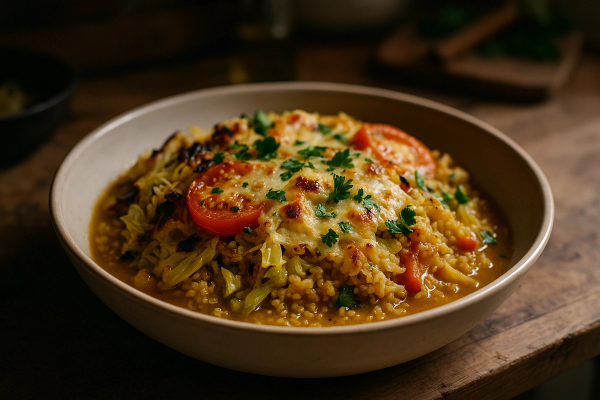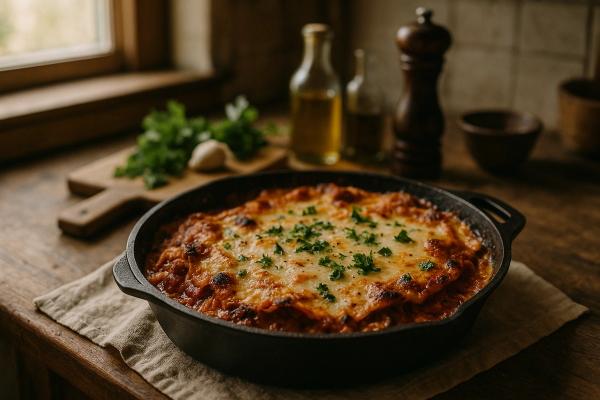Introduction#
Welcome to AllBlogs, your ultimate destination for exploring rich food blogs, travel adventures, tech insights, and lifestyle tips. Today, we dive into the culinary heart of Gujarat, focusing on two beloved breakfast items that have transcended generations: Fafda and Jalebi. Whether you're a food enthusiast or just curious about Gujarati cuisine, this blog is packed with delicious recipes, fascinating histories, and interesting anecdotes.¶
The Origin of Fafda and Jalebi#
Fafda: The Crispy Delight#
Fafda is a savory snack made from chickpea flour (besan) and spices. It’s typically enjoyed during festivals like Dussehra but is also a popular breakfast item across Gujarat. The exact origins of Fafda are somewhat murky, but it’s believed to have been a staple in Gujarati cuisine for centuries. The word 'Fafda' might be derived from the Gujarati word 'Fafadu,' which means something that's flaky or crispy.¶
Jalebi: The Sweet Symphony#
Jalebi, on the other hand, is a sweet treat that's enjoyed all over India, but it holds a special place in the hearts of Gujaratis. Made by deep-frying maida (refined flour) batter in circular shapes and then soaking them in sugar syrup, Jalebi is a festival favorite. Its origins can be traced back to ancient Persia, where it was known as 'Zalabiya,' and it found its way to India through trade routes.¶
The Perfect Combination#
In Gujarat, Fafda and Jalebi are often enjoyed together, creating a perfect balance of savory and sweet. This combination is not just a culinary delight but also a cultural staple, especially during the festival of Dussehra. The crispy, slightly spicy Fafda paired with the syrupy sweetness of Jalebi creates a taste explosion that is hard to resist.¶
Recipe: How to Make Fafda#
Ingredients:#
- 2 cups Besan (Chickpea flour)
- 1 tsp Ajwain (Carom seeds)
- 1/2 tsp Baking soda
- 1/2 tsp Turmeric powder
- 1/2 tsp Black pepper powder
- Salt to taste
- 2 tbsp Oil (for the dough)
- Oil for frying
- Water as needed
Method:#
- Prepare the Dough: In a large mixing bowl, combine the besan, ajwain, baking soda, turmeric powder, black pepper powder, and salt. Add 2 tablespoons of oil and mix well. Gradually add water to make a stiff dough.
- Shape the Fafda: Divide the dough into small portions. Take a portion, roll it into a ball, and then flatten it with your palms to make a thin strip.
- Fry the Fafda: Heat oil in a deep frying pan over medium heat. Fry the strips until they turn golden brown and crispy. Remove and drain on paper towels.
Recipe: How to Make Jalebi#
Ingredients:#
- 1 cup Maida (Refined flour)
- 1 tbsp Cornflour
- 1/2 tsp Baking powder
- 1 cup Yogurt
- 1/4 tsp Turmeric powder (for color)
- 1 tbsp Ghee (for the batter)
- Oil for frying
- 2 cups Sugar
- 1 cup Water
- 1/2 tsp Cardamom powder
- A few strands of Saffron
Method:#
- Prepare the Batter: In a mixing bowl, combine maida, cornflour, baking powder, turmeric powder, and ghee. Add yogurt and mix to form a smooth batter. Let it ferment for 6-8 hours.
- Make the Sugar Syrup: In a saucepan, combine sugar, water, cardamom powder, and saffron. Bring to a boil and let it simmer until it reaches a sticky consistency.
- Fry the Jalebi: Heat oil in a deep frying pan. Pour the batter into a squeeze bottle or piping bag with a small nozzle. Squeeze the batter into the hot oil in circular shapes. Fry until golden and crispy. Soak the fried jalebis in sugar syrup for a few seconds and then remove.

Cultural Significance and Anecdotes#
Dussehra Festivities#
In Gujarat, Dussehra is incomplete without Fafda and Jalebi. After the symbolic burning of Ravana’s effigy, families gather to enjoy this delightful combination. It’s believed that the crispy Fafda represents the victory of good over evil, while the sweet Jalebi signifies the happiness and sweetness that follows.¶
Morning Rituals#
In many Gujarati households, especially in cities like Ahmedabad (અમદાવાદ), Surat (સુરત), and Vadodara (વડોદરા), a typical Sunday breakfast involves a visit to the local Fafda-Jalebi shop. The shops are often bustling with activity, and there's always a friendly debate over who makes the best Fafda and Jalebi in town.¶
Local Favorites#
In Ahmedabad, ‘Oswal’s Fafda-Jalebi’ is a popular name, while Surat's ‘Jalaram Fafda’ is known for its unique flavor. Vadodara’s ‘Shreeji Fafda’ also has a loyal following. These local legends are a must-visit for anyone looking to experience authentic Gujarati flavors.¶
Best Season to Enjoy Fafda and Jalebi#
While Fafda and Jalebi can be enjoyed year-round, they are especially popular during the cooler months and festival seasons. The onset of winter brings a special charm to these dishes, making them a perfect companion for chilly mornings.¶
Fun and Interesting Stories#
The Tale of Fafda Vendor#
There's an old story in Gujarat about a Fafda vendor named Ramu. Ramu was known for his exceptionally crispy Fafda, and his little stall in Rajkot (રાજકોટ) would be crowded from morning till late afternoon. One day, a food critic visited his stall and asked for the secret to his perfect Fafda. Ramu smiled and said, "It's all in the love you put into the dough and the patience you have while frying." This story is often told to emphasize the importance of passion and patience in cooking.¶
Jalebi and the Sweets War#
In the town of Bhavnagar (ભાવનગર), there's an annual competition held during Diwali to see who can make the most intricate Jalebi designs. The competition, known as the ‘Jalebi War,’ attracts participants from all over Gujarat. The winner is awarded the title of ‘Jalebi King’ and gets to share their recipe in the town’s annual cookbook.¶
Conclusion#
Fafda and Jalebi are more than just breakfast items; they are a testament to the rich culinary heritage of Gujarat. From their historical origins to their cultural significance, these dishes offer a delightful experience that’s both savory and sweet. Whether you’re a seasoned cook or a curious foodie, we hope this blog on AllBlogs has inspired you to try making Fafda and Jalebi at home. Enjoy the flavors, share the stories, and keep exploring the world of food with us.¶
Stay tuned to AllBlogs for more exciting food blogs, travel tips, tech insights, and lifestyle stories. Happy cooking!¶














